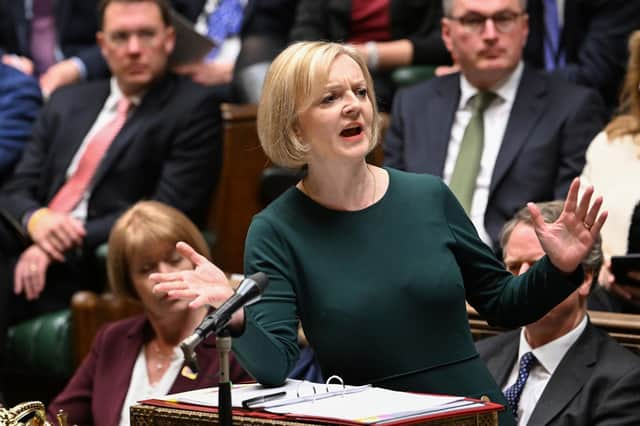Liz Truss rules out public spending cuts but Downing Street warns UK Government faces 'difficult decisions'


The Prime Minister said she is “absolutely” not planning public spending reductions as Labour called for the reversal of a “kamikaze budget”. Downing Street admitted the UK Government faces “difficult decisions” just an hour later.
That came after Business Secretary Jacob Rees-Mogg earlier blamed the Bank of England’s failure to raise interest rates in line with the US for the financial markets turmoil, rather than Kwasi Kwarteng’s mini-budget.
Advertisement
Hide AdAdvertisement
Hide AdSterling fell against the euro and dollar yet again yesreday, with experts warning the UK Government’s plans require tens of billions of pounds’ worth of spending cuts or tax rises.
At a heated Prime Minister’s Questions, Labour leader Sir Keir Starmer opened by asking Ms Truss whether she agreed with her Cabinet colleague, Mr Rees-Mogg.
Declining to answer, the Prime Minister instead repeated her line that the Government had to act to protect people and firms from soaring energy bills.
She added they took “decisive action to make sure we are not facing the highest taxes for 70 years in the face of a global economic slowdown”.
“As a result of our action – and this has been independently corroborated – we will see higher growth and lower inflation”.
Sir Keir then pointed out that during her Tory leadership campaign Ms Truss had pledged “I’m not planning public spending reductions”.
Asked if she is going to stick to that, she replied to gasps in the Chamber: “Absolutely… We are spending almost £1 trillion of public spending. We were spending £700 billion back in 2010.
“What we will make sure is that over the medium term the debt is falling. But we will do that not by cutting public spending but by making sure we spend public money well.”
Advertisement
Hide AdAdvertisement
Hide AdLess than an hour later, the Prime Minister’s official spokesman cast huge doubt over the commitment, warning “difficult decisions” would need to be made on spending when asked whether the cost of the energy package would be used as cover for departmental cuts.
He said: “We are clear there will need to be difficult decisions to be taken given some of the global challenges we’re facing.
“I appreciate the interest but I’m not going to get drawn into what those might look like.”
Responding, the SNP’s Westminster Depute Leader, Kirsten Oswald MP, said: “If the Tories are already rolling back on this categorical commitment, then it simply proves you can’t trust a word Liz Truss says - and the only way to keep Scotland safe from Tory cuts is to become an independent country.
“Having wrecked the economy and trashed household budgets, it’s clear the Tories are now intending to impose billions of pounds of cuts, which threaten our NHS, schools, social security and public services across Scotland.
“People in Scotland will never forgive the Tories if they plough ahead with these devastating cuts."
Treasury Chief Secretary Chris Philp earlier told MPs there will be “iron discipline when it comes to spending restraint” but “we do not plan real-term cuts” – indicating that departmental funding will rise in line with inflation.
Sir Keir also used the session to call for the mini-budget to be reversed, with the Treasury privately admitting it may have been a mistep.
Advertisement
Hide AdAdvertisement
Hide AdHe told Ms Truss: “Does she think the public will ever forgive the Conservative Party if they keep on defending this madness and go ahead with their kamikaze budget?”
The Prime Minister replied: “The way that we will get our country growing is through more jobs, more growth, more opportunities, not through higher taxes, higher spending, and his (Sir Keir’s) friends in the union stopping hard-working people get to work.”
Since the September 23 mini-budget the value of sterling has fluctuated and yields on government bonds, the cost of state borrowing, rose to such an extent that the Bank of England was forced to intervene to prevent problems for pension funds.
The Bank’s governor, Andrew Bailey, confirmed the intervention will end on Friday, leading to a slump in the pound and another spike in bond yields.
The UK 30-year yield on gilts, UK government bonds, passed 5 per cent on Wednesday morning amid growing unease among traders.
Gilt yields, which rise as prices fall, have therefore returned close to the levels which led to the Bank’s initial intervention late last month.
On September 22 the Bank’s Monetary Policy Committee (MPC) raised rates by 0.5 percentage points to 2.25 per cent, but the day before the Federal Reserve raised rates by 0.75 per cent.
But economists insisted that the Government’s decision to increase borrowing without any plan to balance the books was a major factor.
Advertisement
Hide AdAdvertisement
Hide AdThe Institute for Fiscal Studies has suggested that a “fiscal tightening” of £62 billion in 2026–27 will be needed to stabilise debt levels – meaning either tax rises or spending cuts.
It comes amid an ongoing row around raising benefit in line with inflation, something called for by MPs including the former Chancellor Sajid Javid.
Mr Rees-Mogg yesterday refused to say if the Government plans to increase state benefits in line with inflation.
He said: “We haven't yet got the inflation on which benefits will be based, so the figure comes out in a day or two, it's always in the middle of the month following.
“Benefits every year rise in relation to what has happened in September. Some benefits are raised in line with inflation by statute.
"Some are raised in accordance with different principles, but no decision has been made on how benefits will be uprated. So we shouldn't jump the gun on these issues.”
In a further headache for Ms Truss, polling from Redfield and Wilton Strategies showed Labour with a 13 point lead in the Blue Wall, with her party down 22 points.

